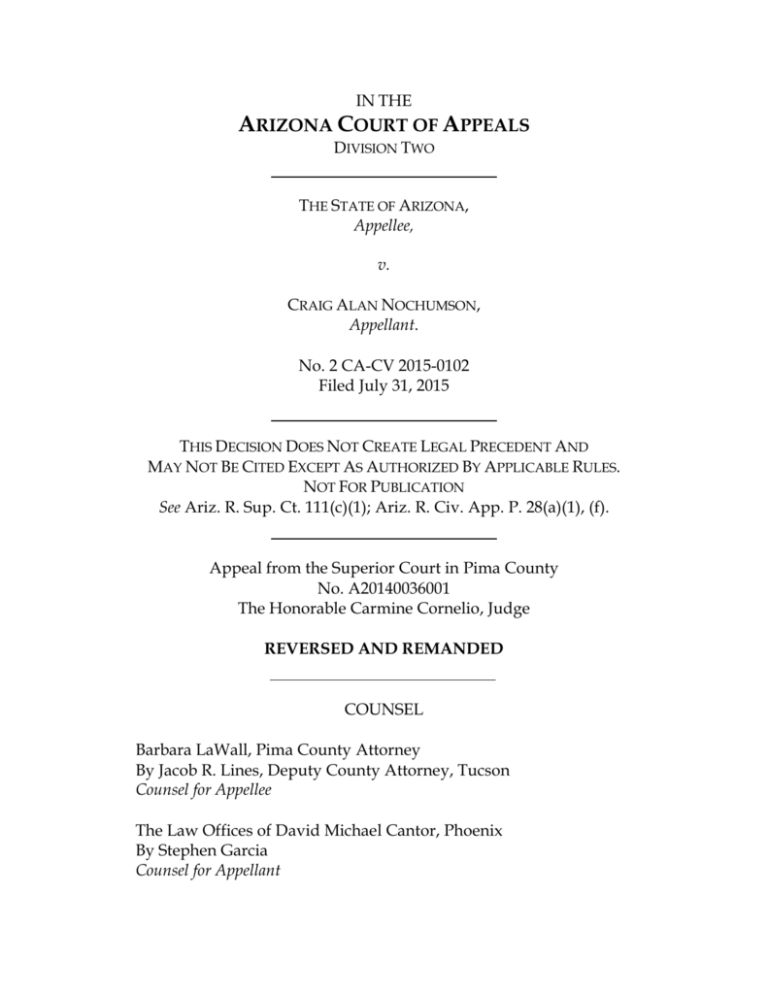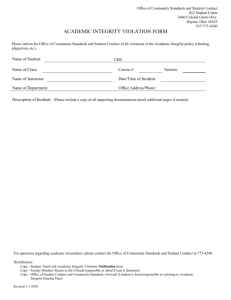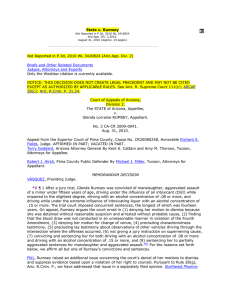
IN THE
ARIZONA COURT OF APPEALS
DIVISION TWO
THE STATE OF ARIZONA,
Appellee,
v.
CRAIG ALAN NOCHUMSON,
Appellant.
No. 2 CA-CV 2015-0102
Filed July 31, 2015
THIS DECISION DOES NOT CREATE LEGAL PRECEDENT AND
MAY NOT BE CITED EXCEPT AS AUTHORIZED BY APPLICABLE RULES.
NOT FOR PUBLICATION
See Ariz. R. Sup. Ct. 111(c)(1); Ariz. R. Civ. App. P. 28(a)(1), (f).
Appeal from the Superior Court in Pima County
No. A20140036001
The Honorable Carmine Cornelio, Judge
REVERSED AND REMANDED
COUNSEL
Barbara LaWall, Pima County Attorney
By Jacob R. Lines, Deputy County Attorney, Tucson
Counsel for Appellee
The Law Offices of David Michael Cantor, Phoenix
By Stephen Garcia
Counsel for Appellant
STATE v. NOCHUMSON
Decision of the Court
MEMORANDUM DECISION
Judge Howard authored the decision of the Court, in which
Presiding Judge Vásquez and Judge Brammer1 concurred.
H O W A R D, Judge:
¶1
Appellant Craig Nochumson appeals from the trial
court’s denial of his petition to terminate his sex offender
registration.
The state has conceded that the elements of
Nochumson’s underlying Illinois conviction do not necessarily
prove the corresponding Arizona offense and has noted that this
court, in its discretion, could review the issue despite Nochumson’s
failure to argue it below. We therefore reverse the trial court’s
ruling and remand for further proceedings consistent with this
decision.
Factual and Procedural Background
¶2
In 2004, Nochumson was convicted of attempted
indecent solicitation of a child in Illinois pursuant to 720 Ill. Comp.
Stat. Ann. 5/11-6. As part of his sentence, he was required to
register with the Illinois Sex Offender Registry. Later that same
year, Nochumson moved to Arizona and, in accordance with
A.R.S. § 13-3821(A), registered as a sex offender.
¶3
In 2014, Nochumson received a notice from the State of
Illinois that he no longer was required to register as a sex offender.
He then filed a petition in the trial court to terminate the registration
requirement in Arizona.
After a hearing, the court denied
Nochumson’s petition, finding that, based on the arguments
presented, a violation of 720 Ill. Comp. Stat. Ann. 5/11-6 would
constitute a violation of A.R.S. § 13-3554. See § 13-3821(A).
1 The
Hon. J. William Brammer, Jr., a retired judge of this
court, is called back to active duty to serve on this case pursuant to
orders of this court and the supreme court.
2
STATE v. NOCHUMSON
Decision of the Court
Nochumson timely appealed. We have jurisdiction pursuant to
A.R.S. §§ 12-2101(A)(1) and 12-120.21(A)(1).
Discussion
¶4
Although the issue was not presented to the trial court
or raised in Nochumson’s opening brief, in the course of our review
we ordered supplemental briefing on the issue of whether a
violation of 720 Ill. Comp. Stat. Ann. 5/11-6 would necessarily be a
violation of § 13-3554 based on the applicable definitions of “sexual
conduct” and what effect, if any, that issue should have on this
appeal. In his supplemental brief, Nochumson argued that we
should address the issue, despite his failure to raise it below, as
fundamental error, citing State v. Henderson, 210 Ariz. 561, 115 P.3d
601 (2005). But he argued previously that this case was civil. 2
Fundamental error review “is sparingly applied in civil cases.”
Bradshaw v. State Farm Mut. Auto. Ins. Co., 157 Ariz. 411, 420, 758 P.2d
1313, 1322 (1988); see also Dawson v. Withycombe, 216 Ariz. 84, n.20,
163 P.3d 1034, 1056 n.20 (App. 2007) (declining fundamental error
review in civil case when appellant “failed to provide any
substantive argument in support of applying fundamental error
review to this case”).
¶5
In the state’s supplemental brief, it notes this court
could, “in the interests of justice,” reverse the trial court’s order,
despite the waiver, and the state then submits the issue to the
discretion of the court.3 See Harris v. Cochise Health Sys., 215 Ariz.
344, ¶ 17, 160 P.3d 223, 228 (App. 2007) (issues not raised below
2This
case originally was assigned a criminal case number, but
Nochumsom implied in his opening brief he was appealing a civil
judgment. After we requested supplemental briefing on the matter,
the parties agreed the case was civil in nature. The appeal then was
stayed pending the trial court’s modification of the judgment to
include language of finality pursuant to Rule 54(c), Ariz. R. Civ. P.,
and it was re-numbered as a civil case.
3We
commend the state on its candor with the court and its
pursuit of justice.
3
STATE v. NOCHUMSON
Decision of the Court
waived for review on appeal). The rule that this court may, in its
discretion, decline to address issues raised for the first time on
appeal is procedural and not jurisdictional. Id. It is “for the benefit
of the party against whom the defense is newly asserted on appeal
and is intended to prevent surprise.” Stokes v. Stokes, 143 Ariz. 590,
592, 694 P.2d 1204, 1206 (App. 1984). An exception to this rule exists
to “redress a wrong . . . where the facts of a particular case so
warrant and the question is one of substantive law presenting no
dispute as to the facts.” Id.
¶6
The facts in this case are undisputed. The issue
presented is one of substantive law. Despite Nochumson’s failure to
bring it to the trial court’s attention, we address the issue for the first
time on appeal to “redress a wrong.” Id.
¶7
Nochumson now argues that he is not required to
register as a sex offender in Arizona because “differing acts that
could constitute” a violation of 720 Ill. Comp. Stat. Ann. 5/11-6
“would not necessarily be” a violation of § 13-3554. The state
concedes he is correct and “if those [differing] definitions had been
presented to the trial court, it should have granted relief.” “Whether
the trial court properly applied § 13-3821(A) is a question of law that
we review de novo.” State v. Kuntz, 209 Ariz. 276, ¶ 5, 100 P.3d 26,
28 (App. 2004).
¶8
Pursuant to § 13-3821(A)(13), a person living in Arizona
who was convicted in another jurisdiction of a crime must register as
a sex offender here if: (1) they are “required to register by the
convicting or adjudicating jurisdiction,” or, as relevant here, (2) the
underlying offense, “if committed in this state[,] would be a
violation or attempted violation of [§ 13-3554].” To determine
whether the foreign conviction would constitute a violation of
§ 13-3554, the elements of the foreign offense at the time the crime
was committed necessarily must prove the Arizona offense that was
in effect at that same time. See Kuntz, 209 Ariz. 276, ¶¶ 5, 9, 100 P.3d
at 28-29. Put another way, a person is not required to register if he
could violate the foreign statute but not violate the corresponding
Arizona statute. Id. ¶ 12.
4
STATE v. NOCHUMSON
Decision of the Court
¶9
In Illinois, a person commits indecent solicitation of a
child, as relevant here, if he “knowingly solicits a child or one whom
he . . . believes to be a child to perform an act of . . . sexual conduct.”
720 Ill. Comp. Stat. Ann. 5/11-6(a). Under Illinois law,
“Sexual conduct” means any knowing
touching or fondling by the victim or the
accused, either directly or through clothing,
of the sex organs, anus, or breast of the
victim or the accused, or any part of the
body of a child under 13 years of age, or
any transfer or transmission of semen by
the accused upon any part of the clothed or
unclothed body of the victim, for the
purpose of sexual gratification or arousal of
the victim or the accused.
720 Ill. Comp. Stat. Ann. 5/11-0.1.
¶10
In Arizona, “[a] person commits luring a minor for
sexual exploitation by offering or soliciting sexual conduct with
another person knowing or having reason to know that the other
person is a minor.” § 13-3554(A). “Sexual conduct” under the
relevant chapter is defined as
actual or simulated . . . [s]exual intercourse,
including genital-genital, oral-genital, analgenital or oral-anal, whether between
persons of the same or opposite sex[,
p]enetration of the vagina or rectum by any
object except when done as part of a
recognized
medical
procedure[,
m]asturbation . . . [, s]adomasochistic abuse
. . . [or d]efecation or urination for the
purpose of sexual stimulation of the
viewer.
A.R.S. § 13-3551(10).
5
STATE v. NOCHUMSON
Decision of the Court
¶11
Consequently, Nochumson could have violated
720 Ill. Comp. Stat. Ann. 5/11-6 in several ways that would not have
constituted a violation of § 13-3554. Cf. State v. Yegan, 223 Ariz. 213,
¶ 16, 221 P.3d 1027, 1032 (App. 2009) (noting Chapter 35.1’s
definition of “‘sexual conduct’ for offenses related to sexual
exploitation of children” narrower than definition found in Chapter
35 “for crimes related to obscenity”). Thus, under § 13-3821(A),
Nochumson was not required to register as a sex offender.
See Kuntz, 209 Ariz. 276, ¶ 12, 100 P.3d at 30.
Disposition
¶12
For the foregoing reasons, we reverse the trial court’s
order and remand to allow the trial court to take any steps necessary
to terminate Nochumson’s registration requirement.
6











